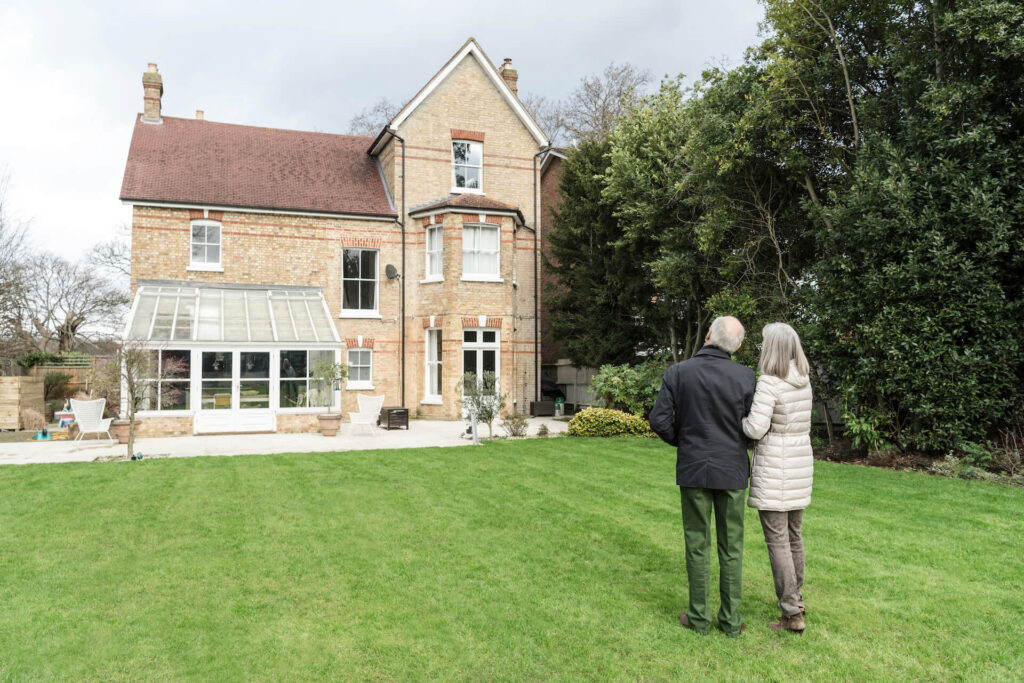Sell house in old age and live in it yourself
Is a sale unavoidable for you, for example for financial reasons? At the same time, you can't imagine parting with your familiar surroundings? What do you do if you would like to stay in your home, but need the proceeds from the sale to maintain your standard of living in old age? There are certainly ways to sell your house or apartment and continue to live in it at the same time:
- Right of residence
- Reverse Mortgage
- Life annuity
- Usufruct
Below we present these four options.
House sale with right of residence
When selling a house with a right of residence, the buyers grant you a so-called lifelong right of residence. This makes sense, for example, when selling a larger residential building with several residential units, as both parties, i.e. the seller and the new owners, can use the property at the same time. The variant of joint living in the same house is most often found when the buyer and seller are related to each other or are very close for other reasons. Also for buyers who are looking for a house or apartment as an investment, buying your property with a life-long right of residence can be quite attractive.
However, one should be aware that a sale that is linked to the condition of a lifelong right of residence also entails disadvantages. On the one hand, the chances of a sale are reduced because there are fewer buyers who agree to the condition of a lifelong right of residence - so the target group of possible buyers is narrowed down accordingly. And the sales proceeds will also be lower than in a conventional sale, since the new owner cannot initially benefit from the property due to your right of residence. If you find a suitable buyer, your lifelong right of residence is regulated by the notarized purchase contract and entered in the second section of the land register. As the new owner, the buyer is thus legally bound to grant you the contractually agreed right of residence.
House sale against reverse mortgage
In the case of a reverse mortgage, you can also stay in your own home until the end of your life while receiving regular payments on your property.
A reverse mortgage is a bank loan that is secured by your real estate. The big difference between this and a normal real estate loan is that no interest and principal payments have to be made from your current income during your lifetime.
In contrast to the sale of a house with a right of residence, under a reverse mortgage you remain the owner of the property with a lifelong right of residence. With this option, there is no change of ownership until the end of your life. Unless otherwise contractually agreed, the previous owner continues to be responsible for the necessary renovation work. At the end of the owner's life, the loan is either repaid or the property becomes the property of the lender.
Whether a reverse mortgage is worthwhile cannot be answered in a generalized way and depends on the individual case. If you are the owner of a largely debt-free property, have no heirs close to you, and would like to have more money at your free disposal in retirement, a reverse mortgage may be right for you. However, it should be noted that the reverse mortgage is generally a very expensive loan. This is because the bank includes large discounts in the valuation of the home due to the risk of a longer than statistically calculated useful life, and the interest rates and fees are also significantly higher than for standard real estate financing.
House sale against annuity
Similar to the case of the reverse mortgage, with the annuity you can continue to live in your property. With both options, you do not have to pay rent and already receive money for your house or apartment during your lifetime. While with the reverse mortgage the payment of the loan amount is possible once or as a recurring annuity, with the life annuity it is usually a recurring payment. At the same time, however, it is also possible to agree on a one-time down payment at the beginning.
The main difference between reverse mortgage and annuity lies in the question of ownership. Unlike with a reverse mortgage, with a life annuity there is a sale and therefore a change of ownership after the notarized purchase agreement has been signed and subsequently entered in the land register. Your rights, such as the lifelong rent-free right of residence, are secured by an entry in the land register. The purchase price for a life annuity is calculated by deducting from the market price of the property the value of the lifelong free right of residence, calculated using statistical parameters. This purchase price is then usually paid out as a regular monthly, quarterly or annual annuity.
A life annuity makes sense above all if you want to stay in your own property in old age, preferably without debt, but at the same time there is a need for additional capital, there are no heirs and you, as the owner, want to hand over responsibility for maintaining the apartment or house.
Sell or give away house with usufruct
Another special form of real estate sale is usufruct. Here, too, you are entitled to a lifelong right of residence. The so-called usufructuary right must be notarized and is entered in the land register. Similar to the life annuity, the house or apartment is actually sold. In contrast to the life annuity or the sale with a lifelong right of residence, however, you as the former owner have significantly more extensive rights: Here, you are not only allowed to occupy the property yourself, but also to rent it out and keep the rental income generated.
The sale of real estate with usufructuary rights often takes place for tax considerations as part of anticipated succession. In this way, a later inheritance tax can be reduced or even avoided in the case of larger assets. The basic idea here is to transfer ownership of the house or apartment to the heirs during their lifetime in the form of a gift and to take advantage of the gift allowances available every 10 years. At the same time, one retains the usufructuary right, i.e. the right to continue to occupy or rent out the property oneself.
Conclusion
To decide on the sale of the owner-occupied property in old age, many emotional and rational factors must be considered. Whether it is worth it or not, and what other options are available for you and your property, should be thoroughly discussed. The important thing is that you ultimately feel comfortable with your choice.
It often helps to involve an independent person. This person can look at your situation from a different point of view and, if necessary, show you new perspectives. As an experienced real estate agent, we will be happy to advise you with empathy and expertise and support you in making the best decision for you.

